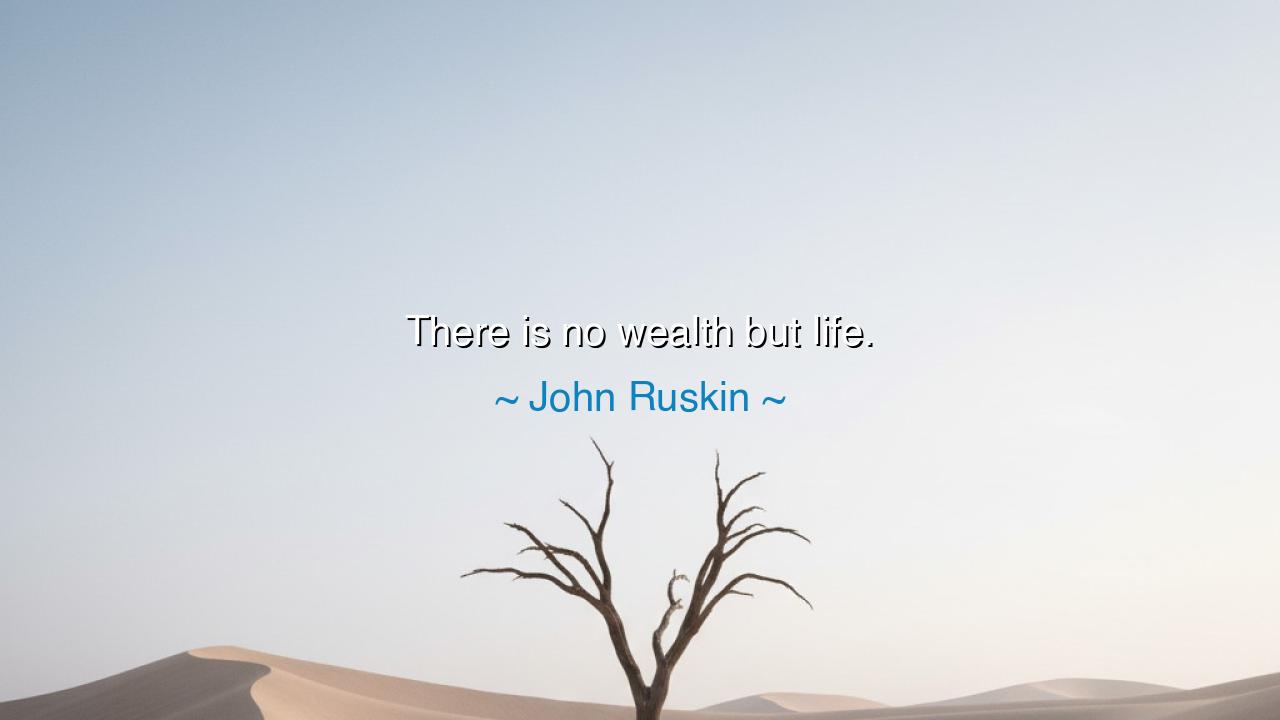
There is no wealth but life.






“There is no wealth but life.” – John Ruskin
These words, spoken by John Ruskin, the English philosopher, artist, and social critic, strike like lightning across the heart of a material age. In a world that measured greatness in gold, Ruskin dared to proclaim that life itself — not property, nor possession, nor profit — is the truest wealth. His voice rose against the cold iron of the Industrial Revolution, when men were reduced to machines and nature was consumed for gain. With this single sentence, he challenged his generation — and ours — to remember that the true treasure of the world is not what can be counted, but what can be felt, lived, and loved.
Ruskin’s teaching springs from both philosophy and compassion. To him, wealth was not the accumulation of coin, but the flourishing of being — the strength of body, the vitality of spirit, the harmony between humanity and the natural world. “There is no wealth but life,” he wrote in Unto This Last (1860), rebuking those who mistook commerce for civilization. He saw cities growing rich while their people grew poor in soul, and he cried out that the measure of a nation’s prosperity is not its gold reserves, but the well-being of its citizens, the health of its rivers, and the joy of its children. To pursue wealth at the cost of life, he warned, is to destroy the very thing one seeks to preserve.
In the manner of the ancients, Ruskin’s wisdom mirrors that of sages who came long before him. The Greeks spoke of eudaimonia — the state of human flourishing, of living in accordance with virtue and nature. To them, true wealth was found in the balance of the soul, not in possessions. Likewise, the Scriptures declare that one may “gain the whole world and lose one’s soul.” Ruskin’s words are a modern echo of this timeless truth: that the value of gold fades beside the radiance of a life well-lived.
Consider the example of Mahatma Gandhi, who many decades after Ruskin, lived by the very essence of this creed. Inspired directly by Ruskin’s book Unto This Last, Gandhi shaped his philosophy of simple living and service. He cast away wealth, power, and privilege, choosing instead the wealth of life — of compassion, truth, and purpose. From the humblest spinning wheel, he spun not only cloth but freedom. Gandhi showed that richness is not what we possess, but what we give — that life itself, when aligned with virtue, becomes the greatest currency of all.
Ruskin’s words also remind us that nature — the living world around us — is the true foundation of wealth. The soil, the air, the forests, and the oceans sustain every breath we take, yet we plunder them as though they were endless stores of coin. But the wise know that when life withers, wealth vanishes with it. The farmer who destroys his land for quick profit, the ruler who sacrifices his people for power — these are the poorest of men. Ruskin’s insight burns with renewed urgency today: if there is no wealth but life, then every act that harms life impoverishes us all.
The lesson is clear: seek not the kind of wealth that perishes, but the kind that endures — the wealth of health, wisdom, love, and purpose. Count not your fortune in currency, but in the strength of your body, the clarity of your mind, and the kindness you sow in others. Honor the living earth; cherish your time and the souls who walk beside you. For the richest life is not the one that owns the most, but the one that most deeply lives.
So live as Ruskin counseled — as a guardian of life’s true riches. Work not to amass, but to nourish. Let your labor heal rather than harm, and your success be measured in vitality, not vanity. For when the final hour comes, no ledger of gold will comfort you, but the memory of the moments you truly lived — the laughter, the love, the quiet grace of being alive. Remember always: there is no wealth but life — and to live fully, kindly, and wisely is to possess all the treasure that eternity can hold.






AAdministratorAdministrator
Welcome, honored guests. Please leave a comment, we will respond soon